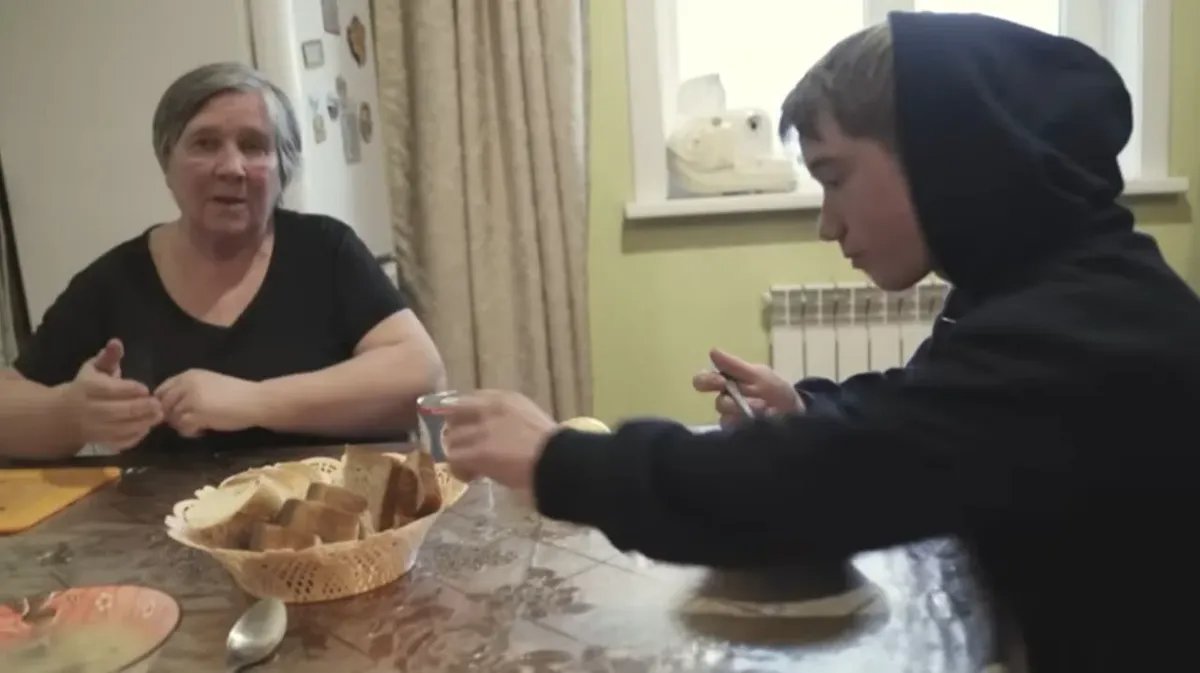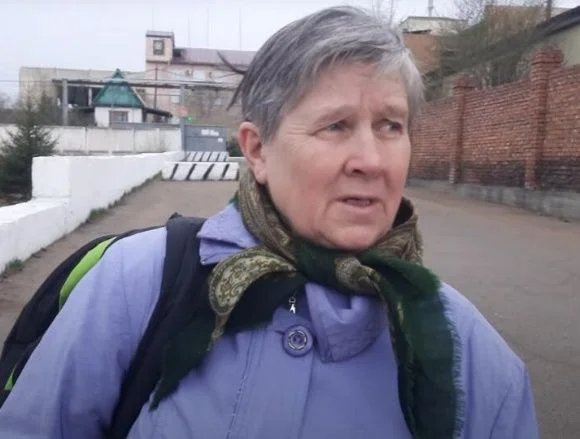
Natalya Filonova and her son Vladimir. Photo taken from personal archives
In Total Defiance
One of the most widespread ways to put pressure on female activists in Russia is to threaten them with separation from their children who will then be put in orphanages. The story of Natalya Filonova, 61, from Buryatia, Russian Far East, serves as a reminder that it can happen. The woman has been kept in a detention facility since October. Her 16-year-old son has been disabled since childhood but, nevertheless, was sent to an orphanage. Filonova was taken into custody after she violated the terms of her house arrest. She left her residence to help her adopted child.
Nadezhda Nizovkina, Filonova’s lawyer, says that her client was charged with a criminal offence in the autumn. In September, after the Kremlin announced a “partial mobilisation” to reinforce Russian troops in Ukraine, both women travelled to the centre of Ulan-Ude, Buryatia’s capital. Nadezhda was streaming live on her social media and asking passers-by questions to learn their views on the draft decision.
“It was not a rally or a one-woman protest. I was alone with my phone. There were no posters or speakers. People were just approaching me to speak their mind. Some people did not even say anything and were just standing nearby.”
“Natalya was also there. In the end, me and ten more people were detained and placed in temporary custody for 24 hours. Well, they spent 24 hours there, while Natalya and myself had to stay in the detention facility for 48 hours,” Nizovkina says.
The women were detained on 24 September and transported to court on 26 September.
It was not Natalya Filonova’s first detention. She was fined 250,000 rubles (€3,100) for protesting in support of Navalny in January 2021 even though her pension is just 11,400 rubles (€142). Activists later managed to overturn the ruling. In May 2022, Filonova was arrested for petty hooliganism. The woman saw a Z sticker on a city bus and asked the driver to remove it. In turn, the driver tried to chase her out. She did not leave the bus. The driver then told other passengers to get off and took Filonova to a police station. Natalya was detained for five days despite being a caretaker for a disabled boy.
“This is a child of her close friend,” Nadezhda Nizovkina told Novaya-Europe. “She died, and Natalya adopted the baby. They learnt later that the child had a cardiovascular issue. His weight is below normal, he has a developmental delay. Natalya has been taking him to doctors all his life and managed to organise a few surgeries for the boy. She was taking him to school and was sitting right next to him to help.”
Filonova graduated with a teaching degree but was working as a journalist for a local newspaper. She resigned when it became impossible to do honest reporting.
“She left the newspaper when the censorship became unbearable,” Nizovkina recalls. “Natalya began publishing In Total Defiance, her own newspaper. She was writing, printing, selling newspapers in suburban trains, and delivering them to newsstands. This was her way of getting closer to people: she was constantly speaking with them, trying to explain what was happening in the country. Printing houses in her local region gradually stopped working with her. Natalya was forced to go to a different area to have newspapers printed. She slowly had to reduce the number of newspaper issues. In Total Defiance shut down completely five years ago.”
Filonova moved to Ulan-Ude also for the sake of her boy who had more chances to receive the necessary healthcare in the regional capital.
Confiscated childhood
On 26 September, when Filonova and Nizovkina were to be tried for staging an unauthorised protest, activists began gathering near the court building to support the women. Nadezhda Nizovkina believes that this was the reason why the court was suddenly evacuated and their case was heard in a different place.
“So, we were transported around a few times throughout the day,” an activist recalls. “We were with Nadezhda this whole time. I was streaming live; they were trying to take away my phone. At some point, they put us on different buses.”
Remarkably, the women won the case and had the charges lifted.
“Filonova and I were not eating anything these two days. We forced the court to study my live stream recording which showed that there was no rally,” Nizovkina says. “The hearing ended at about 2 AM. The other detainees did not even get a hearing, everyone was let go the next day. When Natalya and I left the building, Investigative Committee officers approached us and took us to their department. We were then told that Natalya was facing a criminal case for attacking a police officer.”
According to her, the case was launched after a complaint was filed by a police officer who was escorting Filonova in a car on 26 September where the woman was alone without her lawyer. According to the case report, Filonova tried to stab the police officer with the sharp end of a ballpen and slapped him across the face.
“We then were interrogated on multiple occasions, and then Natalya was suddenly detained right at the school where she took her son to on 21 October,” the lawyer notes. “Natalya was placed under house arrest. It was no longer possible for her to take care of her son’s needs. She sent the boy to her husband in her native district to ensure he’d get the help he needed. However, the man tragically had a heart attack then. The husband was taken to hospital, while the petrified 16-year-old boy with a developmental delay ran away from home. Natalya spent several days pleading with the police to let her go see the boy and take him home. But she was not allowed to.”

Natalya Filonova. Photo taken from personal archives
The case materials state that Natalya then travelled to the area with an ankle monitor, found the child, visited her husband in the hospital, and returned home on 2 November. According to her lawyer, the police did not have any complaints for two weeks. And then she was sent to a detention centre on 17 November.
“Natalya’s relatives tried to take Vladimir to their place but child protection services first placed him in a regional hospital and then to the juvenile detention centre in Ulan-Ude.”
“On 5 March, we learnt that Vladimir was sent to an orphanage which is located 4 hours by car away from Ulan-Ude,” Nizovkina says.
The lawyer underlines that all hearings on extending Filonova’s detention were held behind closed doors. Nizovkina herself is a witness in the case.
“At first, we had a lawyer who told us when hearings would take place, and then he was replaced by another one, we don’t even know his last name. He doesn’t get in touch with anyone at all. I know that Natalya’s case was referred for further investigation, which is a good sign. Apparently, things aren’t going well with the evidence. On the other hand, it’s dragging out the process,” the human rights activist says.
Filonova’s detention was last extended until 6 April. Vladimir will stay in the orphanage this whole time.
‘The state is cruel to children’
Anastasia Shevchenko, a Rostov-on-Don activist, says that using children with disabilities to put pressure on outspoken women has become a trademark of the Russian authorities.
“On the day of my arrest, the first threat I heard from investigating officer Tolmachev and Centre for Combating Extremism agent Krasnokutsky was, ‘You understand that your children will be taken away to an orphanage, right?’ When my eldest daughter was dying alone, no one thought about her, it was important to pressure me, to break me, and they didn’t care what would happen to the child. The younger children were denied medical care because they were my children and I was under house arrest. So, they are not entitled to a doctor’s home visit either,” says Anastasia Shevchenko.
Her 17-year-old daughter Alina died in late January 2019. The girl was kept in a specialised neurological boarding school and was often ill. During the times of acute bronchitis and pneumonia, the woman would check in hospitals with her daughter: she helped pump out sputum, give medication, and feed her. Shevchenko was arrested in mid-January 2019 on charges of cooperating with an undesirable organisation, and a couple of days later Alina fell ill again. Investigating officer of the Russian Investigative Committee Alexander Tolmachev refused the mother’s request to go see her sick child. Anastasia was granted permission to leave the apartment only in the evening of 31 January and found the child dying.
“In Russia, human life is not valued, there is no respect for women or motherhood, and, worst of all, the state is cruel to children.”
“They are zombified from nursery school, used for propaganda in schools, separated from their parents. They are not heard or loved. And this now concerns not only Russian but also Ukrainian children. Hundreds have been killed; thousands taken away. And, of course, children have become a blackmail tool for the terrorist state,” says the activist who got a suspended sentence. She fled Russia with her two children after the war began.
Join us in rebuilding Novaya Gazeta Europe
The Russian government has banned independent media. We were forced to leave our country in order to keep doing our job, telling our readers about what is going on Russia, Ukraine and Europe.
We will continue fighting against warfare and dictatorship. We believe that freedom of speech is the most efficient antidote against tyranny. Support us financially to help us fight for peace and freedom.
By clicking the Support button, you agree to the processing of your personal data.
To cancel a regular donation, please write to [email protected]
